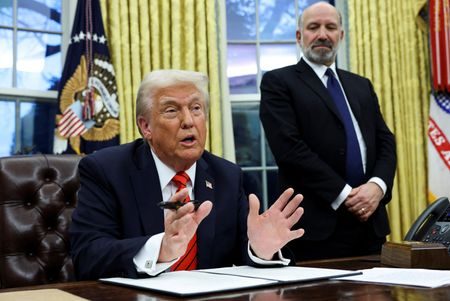By Chris Prentice, Douglas Gillison and Lawrence Delevingne
(Reuters) – A day after the Trump administration sent a missive to all federal employees inviting them to resign, the U.S. Securities and Exchange Commission’s acting boss, Mark Uyeda, addressed staff in a packed auditorium at its Washington headquarters.
In his opening remarks, Uyeda did not delve into job security or the staff’s worries about the new direction of the agency under the Trump administration, which has criticized what it calls the “weaponization” of the SEC’s enforcement functions, according to three SEC officials who listened to the meeting.
Instead, the Republican commissioner spent time talking about his own career.
One of the listeners told Reuters they felt Uyeda’s remarks were “tone deaf,” as many people in the audience worried about the agency’s direction, their jobs and other mandates like forcing employees to return to working in the office five days a week.
Another SEC official in attendance gave Uyeda credit for pressing ahead with the town hall, where he also took questions. The person said that while Uyeda did not sugar-coat his remarks, he had also not said anything that could be perceived as offensive.
Uyeda did not respond to a request for comment for this article. In November, he told Reuters that the SEC will get “a chance to reset its regulatory agenda to focus on capital formation and innovation,” while protecting investors, including senior citizens, from scam artists defrauding them.
Details from the town hall meeting on January 29, which are reported here for the first time, provide a window into how the Trump administration’s sweeping attack on the federal bureaucracy has roiled the securities regulator, which underpins investor confidence in the $110 trillion U.S. capital markets.
The agency’s new leadership has made changes in recent days that start to alter its priorities and how it functions, ranging from a move that centralized power in the hands of Republican-led commissioners to shrinking crypto enforcement, according to more than half a dozen current and former SEC officials.
Within the SEC, two of the former officials said, these steps are seen as a precursor to further restructuring, such as disbanding other specialist units and moving staff into the so-called “core” enforcement team to unwind previous initiatives. Some experts and former SEC officials told Reuters the changes are too quick and ominous.
“Everyone agrees these agencies are large, bureaucratic, inefficient, and there is much to be desired,” said Daniel Taylor, a professor at University of Pennsylvania’s Wharton School with expertise in corporate disclosures, insider trading and fraud prediction. “But you don’t improve the agency by threatening its workforce, having mass layoffs, and making changes without explaining them.”
An agency spokesperson declined to comment on reassignments, but added: “The SEC is fully engaged in enforcement efforts against fraud and other schemes in all areas, including crypto. We are working to enhance accountability regarding our enforcement efforts.”
Some market regulation experts are awaiting the arrival of Paul Atkins, who has been nominated by President Donald Trump to take over as the SEC chair, to get a better sense of the agency’s direction.
“It’s tremendously important to the U.S. economy that we protect the capital markets, and I don’t see Paul Atkins as wanting to destroy that,” said Jill Fisch, professor of business law at University of Pennsylvania law school and an expert on capital markets regulation.
But Fisch added that Atkins will “have a real problem” regulating markets effectively “if there’s some sort of massive pushing” out of people.
Atkins and the White House did not respond to a request for comment.
STAFF SURPRISED
The SEC was caught off guard by the January 28 email from the Office of Personnel Management (OPM), titled the “Fork in the Road”. The email, which has sent shockwaves across the federal bureaucracy, included the end of remote work for most employees and offered those who quit by February 6 to receive pay through September.
A federal judge has temporarily blocked the deferred resignation program, with a hearing scheduled for Monday.
In a January 29 memo seen by Reuters, SEC’s Chief Operating Officer Ken Johnson said the agency first learned about the deferred resignations from the OPM email and was “seeking further clarification about aspects of the program.”
The SEC’s town hall with the commissioners was scheduled before the email went out, two of the agency officials said. The regulator typically has five politically appointed commissioners. Three – two Republicans and one Democrat – are currently in place. All three spoke at the meeting.
Caroline Crenshaw, the Democratic commissioner, acknowledged in her remarks that it had been a difficult week for staff and pledged to support them to the best of her ability.
She noted the administration’s accusation that the SEC had been politicized, saying it was for the political appointees to face retribution, not the staff, one of the attendees said. Her remarks were met by sustained applause.
Crenshaw did not respond to a request for comment.
NEW DIRECTION
Under Atkins, the agency is expected to make a sharp turn away from how his predecessor Gary Gensler, a Democrat, oversaw capital markets. Gensler adopted an aggressive enforcement regime, levying over $20 billion in penalties and other charges.
Atkins has made no secret of his mistrust of much of the SEC’s process for probing and disciplining rule-breakers, and has argued that corporate fines unfairly penalize shareholders.
While Atkins is waiting to be confirmed in the role, Uyeda has started implementing some changes as the acting head. The SEC recently reined in the ability of staff in the enforcement division to issue subpoenas, seen as likely to slow down investigations.
In cryptocurrency, where Gensler took a tough position while Trump has promised deregulation, the SEC has already created a task force to work with the industry. That is led by Republican Commissioner Hester Peirce, known as “Crypto Mom” due to her favorable stance towards the sector.
Peirce did not respond to a request for comment.
In recent days, the SEC also reassigned its top enforcement litigation counsel and downsized the crypto team by moving lawyers working in that group elsewhere, according to two former and one current SEC official. Those reassignments were first reported by the New York Times.
In line with the administration’s dislike for diversity, inclusion and equity policies, the SEC has ended programs such as affinity groups, one current and one former official said.
One affinity group for Asian Americans canceled a Lunar New Year lunch in light of the administration’s guidance, according to a January 24 email seen by Reuters.
“With deep regret, we unfortunately are compelled to cancel this event,” the email read, saying people who had contributed for it would receive refunds.
(Reporting by Chris Prentice, Douglas Gillison and Lawrence Delevingne; editing by Megan Davies, Paritosh Bansal and Edward Tobin)
Brought to you by www.srnnews.com







